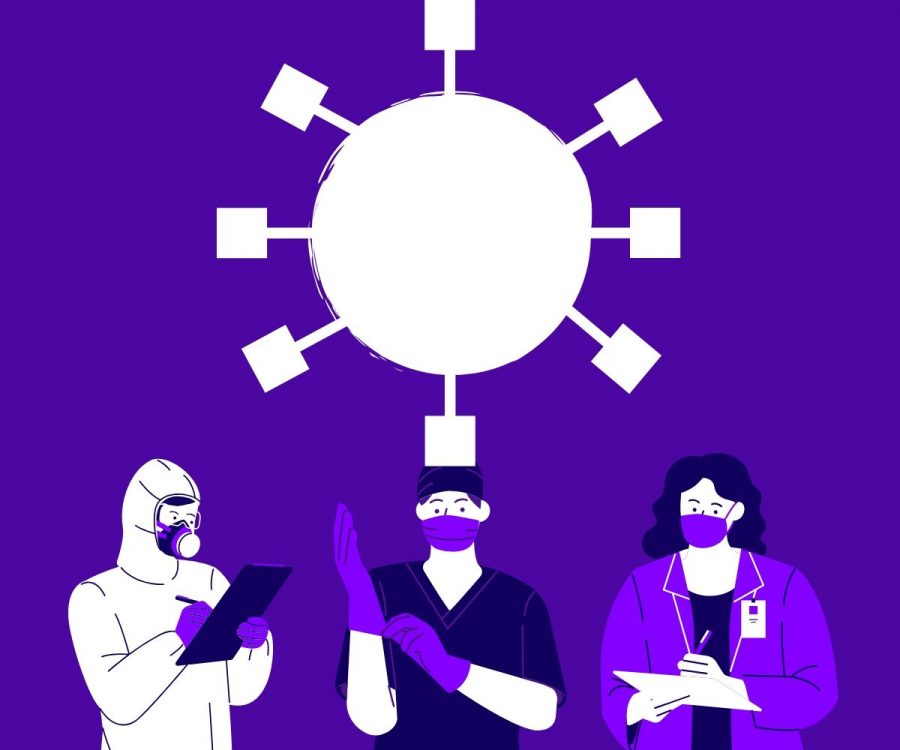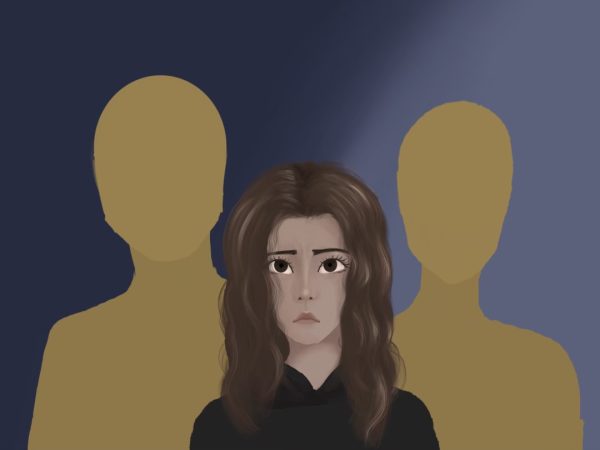The lessons to learn from Covid-19
It’s been 2 months since Governor JB Prtizker issued Executive Order 2020-11, establishing the state-wide stay at home order. Since the start of the pandemic, an economic crisis has destabilized the economy, and crippled the employment rates across the country. Legitimate questions about the authority of the government to enforce this became protests, often armed, that’d take protestors outside the Governor’s homes and even inside assembly halls. All the while, celebrities and companies are still pushing the idea of standing together while underpaying and even abusing their workers during this dire situation. The state of the world is unstable, but not unfixable, there’s not only several lessons to learn from COVID-19, but also lessons that can guide the response to returning to normalcy.
The pandemic, healthcare, and Joe Biden
Before the Presidential primaries were all but halted due to the pandemic, former Vice-President Joe Biden declared that a robust universal healthcare policy would not have helped the United States in a global pandemic. This claim is based on countries like Italy where despite having a robust healthcare system, the pandemic struck hard and fast anyways. While healthcare alone would not have saved the United States from COVID-19 it’s a critical step in ensuring people actually go see a doctor and to quantify the amount of people who have the disease in certain areas.
A great example of this is South Korea, where their single payer healthcare system covers 97% of the population. As cases seemed to double in South Korea, the government was able to identify hotspots and individuals through the Ministry of Health’s records which, since the entire country is covered, was able to literally stop the virus in its tracks. The government never established a lockdown order, instead they only lockdowned infected people who were found through the healthcare system, and now South Korea has a mere 250 deaths with no quarantine compared to nearly 100 thousand deaths in the United States despite a national quarantine being in place. Of course population does factor into it, but considering the highly packed urban settings in South Korea and their large older population seemingly means that they have something figured out. Ultimately healthcare is a piece to the larger puzzle on how to handle the pandemic, but if implemented correctly it can even be the solution.
Quarantine, protests, and individual rights
One of the more concerning aspects of the pandemic for people on both the left and right has been the actual quarantine itself and how it’ll affect individual rights. What’s been made clear at the very least, is that a strong government is necessary to handle situations like these. Too many liberals, conservatives, and even some leftists have been much too eager at this expansion of the federal government’s rights over the people, however. Social-distancing and the American quarantine was necessary, but that doesn’t necessarily mean that it’s good for the Democratic institutions in this country nor the individual rights of the people living within it. The transition to normalcy will be majorly important for this reason, to verify that the individual rights of the collective will also return to normalcy. What lawmakers must make clear, is that this will not be a recurring event in our nation. While stopping a pandemic is obviously reason enough to initiate guidelines like this, it establishes a precedent that’s been used before to restrict individual rights throughout history.
Congress has once again reinstated the Patriot Act, one of the biggest abuses on American freedom in modern history, and the President has begun several measures to attempt to increase the power of the Justice Department and the Department of Homeland Security. Again, quarantine is necessary, but Congress must act to protect American freedoms so that they cannot be infringed upon the next time the government deems it is worth restricting. This starts by passing common sense anti-lobbying proposals to reform Congress itself, and by repealing the Patriot Act and other surveillance ordinances.
Rob DeSantis, beaches, and testing
Rob DeSantis has been one of the most attacked Governors due to his seemingly wild provision to keep Florida beaches open during the pandemic. It seems however, that the Governor has gotten the last laugh as Florida remains one of the most successful states in terms of containing the virus. Many conservatives are quick to use him as an example of competence and rationalness compared to the less conservative Governor Cuomo and the liberal Governors J.B. Pritzker and Gavin Newsom, all of which have had less successful responses to COVID-19.
The real reason why Florida has been successful however is a lot more due to the actual state rather than whatever party controls it. Governor DeSantis essentially made a bet and it worked out in his favor. When he opened beaches in Florida he assumed it’d be harder for a virus to spread due to the heat in the region, something which luckily turned out to be the case. Additionally Florida has a wide infrastructure set up to handle natural disasters like Hurricanes, among these includes records for a large majority of the residents in Florida, which allowed the state to lock down certain older communities, minimize deaths, and with a less harsh lockdown policy as New York or Illinois. Governor DeSantis’ model, however, would simply not work in most other states. In Illinois for example a limited lockdown would just lead to a spike in deaths and possibly extend the period of time the lockdown is necessary due to the climate here, additionally Illinois lacks the infrastructure to target individual communities once again due to a lack of testing and healthcare. Rob DeSantis does deserve some credit though as he pushed for Senior citizens with COVID-19 to be removed from senior citizen homes while Governor Cuomo did the opposite during the early stages of the pandemic. Florida though is the exception, not the solution.
Cuomo, prisons, and poverty
Governor Andrew Cuomo has become a liberal bastion, but there is no real reason why. The governor’s response to the pandemic was riddled with missteps and even some intentional misdeeds. One of the most striking issues that remains ongoing to this day is Rikers Island and the prison population of the United States. Rikers Island has become a hot spot for coronavirus as tons of inmates, 2,000 of which were arrested on low level crimes, have been exposed and are now at risk of contracting COVID-19. Calls for amnesty for several of the inmates were met with quietness from the Governor Cuomo. It wasn’t until recently until some amnisties were declared and Rikers Island began to get some relief. The problem though, was not that there were so many prisoners during a pandemic, the problem is that there were so many prisoners in the first place. The NYPD has said that giving amnesty now would increase crime in New York and that some of the newly released went back to committing crimes, some even violent, but that’s why the prison system is failing in the first place.
America has built a justice system that not only creates reincarceration, but depends on it. Many of the incarcerated men and women aren’t given many work options, rehabilitation options, or drug relief options meaning that they’re essentially given a choice between somehow scraping by in one of the most expensive cities in the world, or to fall back in the laps of crime. In order to prevent prisons from being so packed in the first place, the entire justice system must change and that begins by electing reform minded district attorneys across every city. The situation at Rikers has now been described as a public health crisis, but even before then, Rikers and many more prisons across the United States were a humanitarian crisis.
Democrats, welfare, and Nancy Pelosi
Congress has largely failed to meet the needs of the people throughout the pandemic, and while it’s not surprising it is especially insulting to see Congressional Democrats like Pelosi grandstanding against President Trump when none of their solutions have been remotely up to par to the situation. Even as the first COVID-19 package was being developed, it was Republican Mitt Romney who was the first to suggest a check of $2,000 for every American. The Democrats’ response was to instead offer $1,200 that was means tested. Of course there were several proposals from lawmakers that aimed to do much more from Senators like Bernie Sanders, Sharrod Brown, and Elizabeth Warren, but the Democratic leadership failed to offer any sort of comprehensible package to help the American people.
Welfare in particular is something that’s especially needed during this pandemic as people have begun protesting the quarantine in place. While some of the people protesting are definitely upper class Americans who would rather have someone risk their lives to give them a haircut, a large portion of that group are just poor and middle income Americans who just want to make a living again. Many that don’t follow politics only see Donald Trump’s name on the $1200 checks, they only see the occasional viral moment or viral statement a lawmaker makes, they won’t see the debates or proposals Democrats are attempting to make. This is where traditionally the leadership is supposed to shine and make it clear that the Democrats are heading the effort to return to normalcy and protect the average worker, but instead both Pelosi and Schumer are so low-energy that they’ve failed to establish a proper Democratic response at all, let alone one that will actually help working Americans. The Democrats have lucked out that the current President has made so many mistakes himself, because otherwise the 2020 election would be a washout.
Trump, AMLO, and market obsession
President Donald Trump and Mexican President Lopez Obrador don’t have much in common ideologically, but they do have two major similarities: Both are populists and are obsessed with markets. Trump from the beginning did not do enough to prevent the pandemic nor even acknowledged the potential danger that it could bring. The line of thought from the President has been to preserve market viability for as long as possible while pushing the idea that like Bush Jr., he too was a wartime President. The results have been mixed to say the least. AMLO too has taken a similar approach with market viability and as such took a very similar approach in how the pandemic would hit Mexico. Both countries went into lockdown much later than they should have and in both countries the poor have suffered the most because of it. The root of the problem for both of the leaders has been their obsession with markets and making sure they don’t destabilize, which is an admirable reason but has some major flaws to it. AMLO as a President in Mexico had a lot of good ideas and broke some major ground in reforming the chaotic and corrupt Mexican government, but has always been held back out of fear of losing some economic growth. AMLO was a leftist President from the start so many across the globe kept pushing the idea that he would lead Mexico into economic destruction and into the next Venezuela. Putting aside the obvious things that’s wrong with that line of thinking, it’s nevertheless effective as the leftist president promised that the economy would not shrink at all, and the federal budget would not grow at all, under his Presidency. This, while well intentioned, is a recipe for disaster for AMLO.
The situation in Mexico is dire and to alleviate the situation major economic initiatives have to be passed and yes, that will slow economic growth, but in the end it’ll relapse when the lower and middle classes have more capital to spend. When one is too afraid to push any policies like this though, it leads into the same neo-liberal policies that don’t fix anything and will only lead to a much harder downfall later. With Trump, the obsession with markets is a lot more due to his party position. Lots of Republicans have attempted to worm the idea of opening up and “sacrificing” the elderly as a necessary evil to reopen the economy. This obsession with markets and capital is what has led to another crisis, the destruction of resources. As oil, meat, and dairy all have reached critical lows, the resources are being dumped, euthanized, and burnt, in order to artificially raise prices. This is all happening as meat and dairy shortages continue and people are at risk of going hungry all across the country. It’s clear that the markets are failing, and instead of trying to stabilize them by giving the people more capital to work with, Republicans in Congress are instead bailing out big business and quite literally pumping the Fed with money to just keep the line from going down. Trillions of dollars have been spent to fix these markets as both parties refuse to admit that the problem itself is the reliance on the market in the first place. There’s no easy answer as to how to rebuild the economy from here, but it won’t be by doing nothing and just letting the line trickle up while the middle class grows smaller and smaller. By pursuing trickle up policies like monthly $2,000 checks for every American during the pandemic, more Americans would be able to spend and would keep the economy alive rather than pumping trillions into the fed while unemployment grows.
Lots of proposals and ideas have begun tor rise for what happens after this pandemic. There’s no easy way to tell just how the world will be affected by it, but one thing is clear. Many of the problems that have popped up during this pandemic were avoidable, and by beginning to pursue policies that will alleviate these issues in the future, the next pandemic may not be so destructive.

Marco Rivero is a senior at Metea Valley and is spotlight Editor for the Stampede. When he's not listening to music, Marco enjoys keeping up with politics...











